Majorca is a paradise – if you can stand it
3 min read


Gertrude Stein and Her Mallorcan Sojourns
Gertrude Stein, a central figure in the American literary modernist movement, visited Mallorca twice. Her visits were not merely holidays; they were explorations of a landscape and culture that fascinated her. Stein was approached by the British writer Robert Graves, who was contemplating making Majorca his permanent home. In response, she offered her now-famous advice that Majorca was indeed a paradise, but one that might not suit everyone's tastes or lifestyle.
Stein enjoyed the tranquillity and natural beauty of the island, but her remark suggests that she also recognised its limitations. According to the most plausible interpretation, Stein found Majorca's lifestyle—provincial, unsophisticated, village-like, slow, and narrow—potentially off-putting for those considering making it their permanent residence.
The Enigma Behind the Words
The enigmatic nature of Stein's words lies in their dual meaning. On one hand, Majorca is a paradise with its breathtaking landscapes and serene beaches. On the other, its provincial lifestyle could be a deterrent for those accustomed to a more cosmopolitan existence. This duality is what makes her observation so compelling and relevant even today.
Modern Challenges: A Paradise at Risk?
In the present day, Stein's words resonate as Mallorca faces the challenges of maintaining its natural beauty and cultural heritage amidst the pressures of tourism, economic growth, and modernisation. One of the main issues is the soaring cost of living on the island. For instance, rental prices in Palma have increased by 75% over a decade, making housing unaffordable for many local workers. Businesses, too, are feeling the pinch, struggling to keep up with the escalating costs.
The Millionaire Magnet
Recent data shows that the number of people who pay wealth tax in the Balearics has risen by almost 20% in the last five years. To qualify for this tax, one must have wealth in excess of €700,000. In 2016, a total of 7,489 people paid this tax, and the number has now risen to 8,903. The fantastic climate and relaxed way of life in the Balearics have become a magnet for millionaires, who have moved to the island in large numbers in recent years. This influx of wealth is clearly evident in property prices, as the islands boast some of the most expensive homes in Spain. Even the island's yacht clubs are brimming with super-yachts. British luxury car-maker Aston Martin is even considering opening an office on the island due to the large number of vehicles of this type owned by both Spanish and foreign residents.
The Social Impact
While the influx of wealth brings economic benefits, it also has social implications. The rising cost of living is making it increasingly difficult for the average person to make ends meet. The perception of foreigners as super-wealthy is distorting the local view, even though the vast majority are not millionaires and are feeling the pinch of the rising cost of living just as keenly as the locals.
The Future: Balancing Growth and Preservation
As we move forward, the challenge for Mallorca will be to balance its economic growth with the preservation of its unique character and natural beauty. The island's government, residents, and visitors all have a role to play in this endeavour. As Stein's quote suggests, maintaining a paradise is not always easy, but it is a challenge worth undertaking.
Conclusion
Gertrude Stein's relationship with Mallorca was complex, marked by both admiration and a keen awareness of its limitations. Her words serve as a cautionary note, reminding us that even a paradise has its challenges. As Mallorca navigates the modern complexities of tourism and economic growth, the spirit of Stein's quote continues to ring true: Mallorca is indeed a paradise, if you can stand it.
